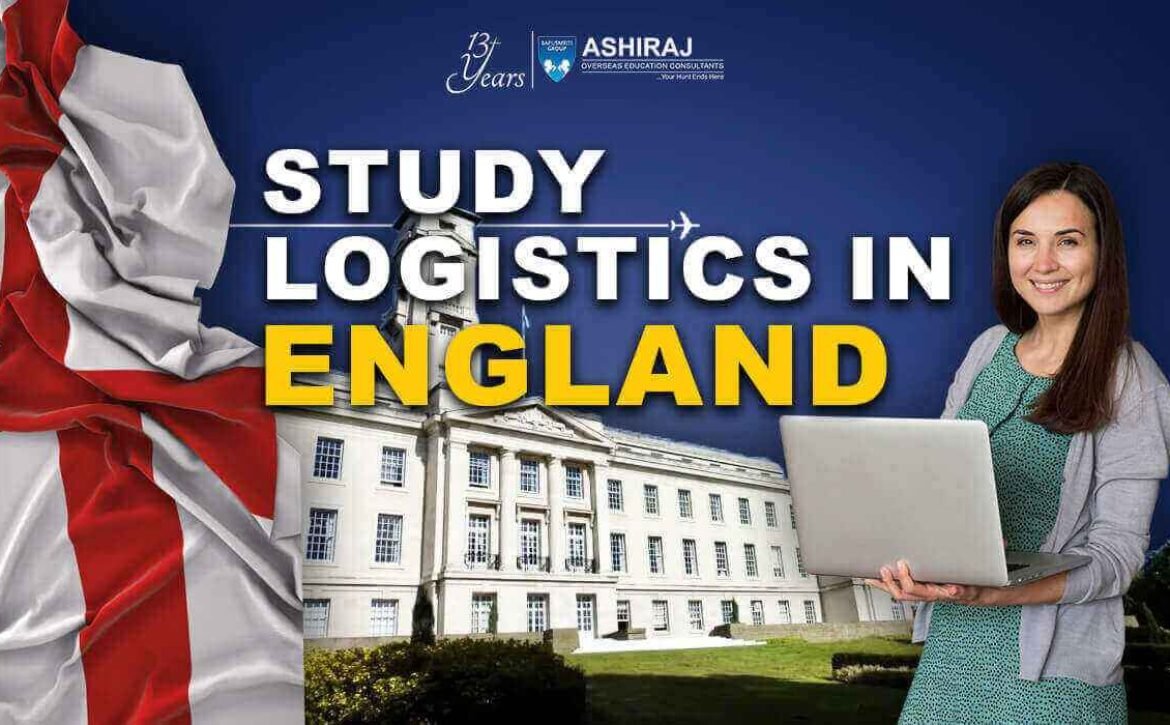
Logistics in England
Logistics in England is a multifaceted and dynamic system that plays a pivotal role in ensuring the seamless flow of goods and services across the country. From the bustling ports of Liverpool to the strategic distribution hubs in London, the logistics infrastructure in England is a well-oiled machine that drives the nation’s economic engine. With a rich history rooted in trade and commerce, England has evolved its logistics practices to meet the demands of the modern globalized world.
Logistics in ENGLAND encapsulates the essence of this intricate network, reflecting the interconnected web of transportation, warehousing, and distribution channels that characterize the logistics landscape in England. As businesses strive for efficiency and timely delivery, the study and optimization of Logistics in England become paramount, influencing supply chain strategies and shaping the economic landscape of this vibrant nation.
Why to Study Logistics in England?
- Unlocking Opportunities:
Studying Logistics in England opens doors to a plethora of opportunities in a nation known for its robust and globally connected logistics industry.
- Strategic Location:
Situated at the crossroads of international trade, England’s logistics sector benefits from its strategic location, providing students with firsthand exposure to diverse supply chain dynamics.
- Industry Integration:
With a rich history in trade and commerce, England seamlessly integrates academic learning with real-world industry practices, allowing students to grasp the nuances of logistics through practical experiences.
- Cutting-edge Education:
Logistics programs in England are designed to incorporate the latest advancements in technology and management, ensuring that students are well-equipped to tackle the challenges of a rapidly evolving industry.
- Global Networking:
Studying logistics in England facilitates unparalleled networking opportunities, connecting students with industry leaders, professionals, and fellow students from around the world.
- Career Advancement:
A degree in Logistics from England serves as a launchpad for a successful career in the global logistics arena, where demand for skilled professionals is consistently on the rise.
- Logistics in ENGLAND:
By immersing oneself in the study of Logistics in England, students not only gain a comprehensive understanding of the subject but also contribute to the legacy of a nation that continues to drive innovation and excellence in logistics.
Top Universities to Study Logistics in England
University | QS World University Ranking 2023 | Type of University | Average Annual Fees | Programs Offered |
University of Cambridge | 5 | Research-intensive | £9,000 – £22,000 | MSc in Logistics and Supply Chain Management |
Imperial College London | 8 | Science and Technology | £15,000 – £30,000 | MSc in Global Supply Chain Management |
London School of Economics (LSE) | 14 | Social Sciences | £23,376 | MSc in Management of Information Systems and Digital Innovation |
University of Oxford | 4 | Collegiate | £11,100 – £26,770 | MSc in Major Programme Management |
University College London (UCL) | 10 | Research-intensive | £15,000 – £31,000 | MSc in Operations and Technology Management |
Embarking on a journey to study Logistics in England? Here’s a concise guide to the top universities, their QS World University Rankings 2023, and key details. The University of Cambridge, ranked 5th globally, offers an MSc in Logistics and Supply Chain Management with fees ranging from £9,000 to £22,000. Imperial College London, known for its focus on science and technology, stands at 8th place globally, providing an MSc in Global Supply Chain Management with fees ranging from £15,000 to £30,000. The London School of Economics (LSE), ranked 14th, emphasizes social sciences and charges an average of £23,376 for programs like the MSc in Management of Information Systems and Digital Innovation. The University of Oxford, ranked 4th globally, offers an MSc in Major Programme Management with fees ranging from £11,100 to £26,770. Lastly, University College London (UCL), positioned at 10th place, focuses on research-intensive programs like the MSc in Operations and Technology Management, with fees ranging from £15,000 to £31,000. Studying Logistics in England at these top universities ensures not only quality education but also a global perspective on supply chain management.
Course Curriculum for Logistics in England
- Holistic Approach:
The course curriculum of Logistics in England adopts a holistic approach, providing students with a comprehensive understanding of the intricacies of supply chain management.
- Core Modules:
Key modules cover logistics fundamentals such as transportation, warehousing, inventory management, and procurement strategies, ensuring a solid foundation in the core principles.
- Technology Integration:
With a keen focus on technology, the curriculum incorporates cutting-edge tools and software used in the logistics industry, preparing students for the digital transformation of supply chain processes.
- Global Perspectives:
Recognizing the international nature of logistics, the curriculum explores global supply chain dynamics, trade regulations, and cross-border logistics, equipping students to navigate diverse markets.
- Industry Collaboration:
Many programs foster collaboration with industry partners, offering real-world projects, internships, and guest lectures, enhancing practical knowledge and fostering connections within the logistics sector.
- Sustainability and Ethics:
Addressing contemporary concerns, the curriculum often includes modules on sustainable logistics practices and ethical considerations, reflecting the industry’s commitment to responsible and eco-friendly operations.
- Logistics in ENGLAND:
The Logistics in England course curriculum not only aligns with industry standards but also reflects the unique challenges and opportunities presented by the logistics landscape in England. It prepares students to contribute meaningfully to the dynamic and evolving field of logistics, both locally and on the global stage.
Eligibility Criteria & Admission Requirements for Logistics in England
- Language Proficiency:
IELTS or TOEFL scores are essential to demonstrate proficiency in English.
IELTS requirement typically ranges from 6.5 to 7.5, while TOEFL scores may range from 80 to 110.
- Academic Qualifications:
A bachelor’s degree in a relevant field is commonly required.
Specific GPA requirements may vary, with a typical minimum of 3.0 on a 4.0 scale.
- Standardized Tests:
GRE or GMAT scores may be required, depending on the university.
GRE scores of 300-320 or GMAT scores around 600-700 are often considered competitive.
- Documentation:
Valid passport and student visa are mandatory for international students.
Certified academic transcripts and certificates from previous educational institutions.
- Work Experience:
Some programs may prefer or require relevant work experience in the logistics or related field.
Navigating the eligibility criteria for Logistics in England involves meeting language proficiency standards (IELTS or TOEFL), presenting competitive GRE or GMAT scores, providing essential documentation such as passport and student visa, and showcasing academic qualifications and work experience. These criteria ensure that students are well-equipped to excel in the rigorous academic and practical aspects of logistics education in England.
Documents Required for Studying Logistics in England
- Passport:
A valid passport is the primary identification document required for international students aspiring to pursue Logistics in England. Ensure it has sufficient validity for the entire duration of your study.
- Letters of Recommendation (LOR):
Two well-crafted LORs from academic or professional references endorse your suitability for the logistics program. These letters provide insights into your character, achievements, and potential.
- Statement of Purpose (SOP):
The SOP outlines your academic and career goals, emphasizing why you are an ideal candidate for the Logistics program. It allows the admissions committee to understand your motivations and aspirations.
- Curriculum Vitae (CV):
A comprehensive CV detailing your academic and professional experiences, skills, and achievements is essential. It provides a snapshot of your qualifications and capabilities.
- Educational Certificates:
Submit official high school transcripts and educational certificates, verifying your academic background and eligibility for the chosen logistics program.
- Work Experience Certificate:
If applicable, include a work experience certificate to showcase relevant professional background in logistics or related fields, enhancing your application.
- Proof of Financial Resources:
Demonstrate your ability to fund your education by providing proof of financial resources. This ensures you can cover tuition, living expenses, and other associated costs during your Logistics in England program.
- Logistics in ENGLAND:
Assembling a comprehensive set of documents not only fulfills the requirements for studying Logistics in England but also reflects your commitment to a rigorous application process. These documents collectively contribute to a compelling narrative of your academic and professional journey.
Admission Process for Logistics in England
- Research and Choose Programs:
Begin by researching logistics programs in England. Identify universities offering comprehensive courses aligned with your career goals.
- Check Eligibility Criteria:
Review the eligibility criteria, considering factors like language proficiency, academic qualifications, and any specific requirements for work experience or standardized test scores.
- Prepare Necessary Documents:
Gather essential documents such as passport, academic transcripts, letters of recommendation, statement of purpose, curriculum vitae, and proof of financial resources.
- English Language Proficiency Test:
If required, take the IELTS or TOEFL exam, ensuring you meet the minimum language proficiency scores for Logistics in England programs.
- Standardized Tests (if applicable):
Prepare for and take the GRE or GMAT if required by the chosen university. Ensure your scores align with the program’s admission criteria.
- Submit Online Application:
Complete the online application form for the selected logistics program. Provide accurate information and attach all required documents.
- Await Admission Decision:
After submitting your application, patiently await the admission decision. Universities typically communicate acceptance or rejection within a specified timeframe.
- Obtain Student Visa:
Once accepted, initiate the process of obtaining a student visa. Ensure all visa requirements are met for a smooth transition to studying Logistics in England.
Navigating the admission process for Logistics in England requires careful planning and attention to detail. Each step contributes to a successful application, positioning you for a rewarding academic journey in the dynamic field of logistics.
“Education is the most powerful weapon which you can use to change the world.”
Nelson Mandela
Cost of Logistics Course in England
- Tuition Fees:
The cost of studying Logistics in England involves tuition fees, varying based on the university and program. On average, tuition can range from £9,000 to £30,000 per academic year.
- Accommodation Expenses:
Accommodation costs depend on factors like location and housing type. On-campus housing or private rentals contribute to the overall cost. Monthly expenses can range from £500 to £1,500.
- Living Expenses:
Day-to-day living expenses cover food, transportation, utilities, and personal items. Budgeting for these essentials can range from £500 to £800 per month.
- Books and Supplies:
Factor in the cost of academic materials, books, and supplies. While some resources may be available online, budgeting around £200 to £500 per year is prudent.
- Health Insurance:
International students often require health insurance, adding to the overall cost. This can range from £150 to £300 annually.
- Miscellaneous Costs:
Consider additional expenses such as social activities, travel, and unforeseen circumstances. Budgeting around £500 to £1,000 per year allows for flexibility.
- Part-time Work Opportunities:
Some students opt for part-time work to supplement their income. However, it’s essential to balance work and studies to maintain academic focus.
- Logistics in ENGLAND:
Understanding the comprehensive cost of studying Logistics in England is crucial for effective financial planning. Budgeting for tuition, accommodation, and living expenses ensures a smooth academic journey in this vibrant and dynamic field.
Scholarships for Logistics Courses in England
Scholarship Name | Eligibility Criteria | Amount | Application Deadline |
Logistics Excellence Scholarship | Academic excellence in Logistics or related field | Up to £5,000 per academic year | March 31, 2023 |
Global Leadership Award | Demonstrated leadership skills and community involvement | £7,500 per academic year | February 15, 2023 |
Future Innovators Scholarship | Innovation in logistics and supply chain management | £10,000 one-time award | May 15, 2023 |
Diversity and Inclusion Grant | Underrepresented backgrounds in logistics field | £3,000 per academic year | April 15, 2023 |
Women in Logistics Scholarship | Female students pursuing logistics studies | £5,000 one-time award | June 30, 2023 |
Numerous scholarships cater specifically to students pursuing Logistics in England, providing financial assistance and recognition for academic excellence, leadership, innovation, diversity, and inclusion. Prospective students should meticulously review the eligibility criteria and deadlines for these opportunities, ensuring they align with their academic and personal achievements. Securing a scholarship not only eases the financial burden but also acknowledges and supports the commitment of students pursuing excellence in the dynamic field of logistics in England.
Career Opportunities After Logistics in England
Job Profile | Description | Average Salary |
Logistics Manager | Overseeing the entire supply chain, optimizing processes, and ensuring efficiency in transportation and warehousing. | £40,000 – £60,000 per year |
Supply Chain Analyst | Analyzing data and trends to enhance supply chain efficiency, reduce costs, and improve overall logistics performance. | £30,000 – £45,000 per year |
Procurement Specialist | Managing the procurement process, negotiating contracts, and sourcing suppliers to ensure cost-effective and quality acquisitions. | £35,000 – £50,000 per year |
Operations Coordinator | Coordinating day-to-day logistics operations, liaising with various stakeholders, and ensuring seamless supply chain activities. | £25,000 – £40,000 per year |
Transportation Planner | Planning and optimizing transportation routes, modes, and schedules to achieve cost savings and timely deliveries. | £30,000 – £45,000 per year |
Completing a logistics program in England opens the door to a variety of career opportunities with competitive salaries. Whether you aspire to be a Logistics Manager, Supply Chain Analyst, Procurement Specialist, Operations Coordinator, or Transportation Planner, the dynamic field of logistics in England offers diverse roles. The average salaries reflect the rewarding nature of these positions, providing a stable and prosperous career path for individuals with expertise in logistics. Pursuing a career in logistics in England not only aligns with the nation’s rich history in trade and commerce but also offers a promising future in a globally connected and economically vibrant environment.
Frequently Asked Questions About Logistics in England
Logistics in England has a vast scope, given its strategic location for global trade. It encompasses roles like Logistics Manager, Supply Chain Analyst, and more, contributing to the efficient flow of goods and services.
Yes, several scholarships cater to Logistics students in England, rewarding academic excellence, leadership, and diversity. Explore opportunities like the Logistics Excellence Scholarship and the Global Leadership Award.
Entry requirements vary, but commonly include a relevant bachelor’s degree, language proficiency (IELTS/TOEFL), and, in some cases, standardized test scores (GRE/GMAT) or work experience.
The cost includes tuition fees, accommodation, living expenses, and other miscellaneous costs. On average, tuition ranges from £9,000 to £30,000 per year.
Yes, international students can explore part-time work opportunities to supplement their income. However, it’s essential to balance work and studies.
Salaries vary based on roles. A Logistics Manager can earn £40,000 – £60,000 per year, while roles like Supply Chain Analyst or Transportation Planner average £30,000 – £45,000 per year.
Yes, many international students opt to stay in England after completing their logistics program by securing a work visa or exploring other post-study work options.
The duration varies, but a master’s program typically takes one to two years, depending on the specific course and university.
The job market is favorable, with a growing demand for skilled logistics professionals. The strategic importance of logistics in England ensures a steady demand for expertise in the field.
Many Logistics programs in England collaborate with industry partners, offering opportunities for internships, real-world projects, and networking, enhancing the overall educational experience.




